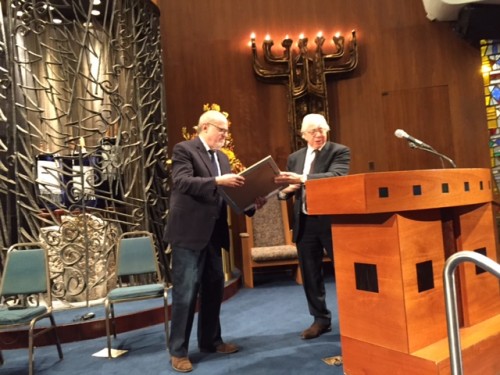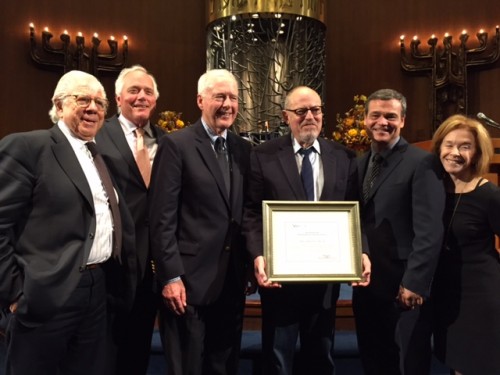December 13th, 2015
About 150 people from the publishing and cultural worlds of New York City turned out on November 4 to honor Jonathan Segal, winner of BIO’s second annual Editorial Excellence Award, and to hear some of the many biographers he’s worked with extol his dedication to his writers and the books they create.
BIO board member Will Swift acted as MC for the evening, and he began by noting the “extraordinary loyalty” Segal engenders in his writers. That loyalty is reflected in part by how long writers choose to stay with him. Panelists Paul Hendrickson, Eric Lax, and T. J. Stiles, along with moderator Kate Buford, have almost a century of combined experience working with Segal.
Panel Discussion
Before the panelists sung Segal’s praises, they addressed the issue, “How Do Great Biographies Get Made, and Why Do They Matter?” Buford began by asking the writers how they get their ideas. Stiles said he looks for strong stories that address some moral question of right and wrong. His subjects tend to be morally compromised in some way. Lax is drawn to people whose lives pose questions—questions he’s compelled to find answers to. He said the subject has to be someone “you’re willing to live with for the time it takes to do that.” Lax, whose subjects have included Woody Allen, also talked about the difference of writing about living and dead subjects. Since the former’s life is still unfolding, “You can be much more surprised by the living person than the dead person.”
For the process of writing, Hendrickson saw it as an act of discovery: “Where a book starts out is not where a book is going to end up.” Biographers need to be willing to follow where the story they uncover takes them, he said.
Of course, that process depends on what kinds of sources the biographer uncovers. While writing about Jesse James, Stiles had no diaries, no internal sources, to work with. For that kind of book, putting the subject in a historical context provided some of the plot. Writing about Cornelius Vanderbilt, many of Stiles’s sources stressed the subject’s business dealings, so that shaped the book. Stiles said, “Make a virtue out of what your material is.”
The panelists also examined the role of morality in capturing a persona. “Part of what moves me forward is trying to understand the underlying morality [of a subject],” Hendrickson said. Lax said one of his goals is to try to understand the person underneath the persona, their values and what drove them to live the life they did—“the intangible things that make a person a person.” The writer’s own sense of morality factors in, too. Stiles said writers should treat their subjects with “simple decency” and “honor the three dimensional humanity” even with subjects who commit bad acts.
Segal’s Influence
The panelists spent time discussing their lengthy relationships with Segal and what makes him such a great editor. Buford recounted Segal’s exhortation to “think harder” and to control tangents—bring the story back to the subject. Hendrickson described Segal’s role in helping him find the focus for his book on the civil rights era, Sons of Mississippi. Hendrickson also praised Segal for his patience and letting the author work at his own deliberate pace.
Segal doesn’t want to just help produce a book that will sell; he wants his authors to be better writers. Segal relies on an intuition that tells him something is wrong. To solve it, Stiles said, “He doesn’t tell me what I had to do, but where I had to do it.” Lax had a similar view: Segal wants to help authors produce the best book they can write.
The Editorial Excellence Award
As he introduced Carl Bernstein, who gave Segal his award, Swift condensed the thrust of the panelists’ comments into a simple observation: Segal “loves all authors.” Bernstein then described his relationship with Segal as the two of them worked on Bernstein’s biography of Hillary Clinton. Segal, with a background in journalism, knew the story was still unfolding, and he didn’t hector his author to speed up the writing process. Bernstein came to see that “Jon is interested, above all, in the truth. And the book isn’t there until he thinks you’ve reached the truth.”
Bernstein commented on the collaborative nature of working with Segal. He encourages authors to dig deeper, and then helps shapes the writing, but in the end, “it’s still your work, but you know it is your work that has come from a place you couldn’t have reached on your own.”
Accepting his award, Segal said he was deeply touched and humbled. He traced his career in publishing, starting as a journalist at the New York Times. He recounted reviewing a children’s book for his first assignment, and for another story, approving the headline “Man Kills Self, Then Wife.” An editor at the paper suggested, “The quality of your writing is such that you might want to try editing.” That comment set Segal off on the path that led him to touch the careers and lives of many biographers. The writers, he added, have enriched his life as well.
The evening’s event was coordinated by BIO board members Kate Buford, Gayle Feldman, Anne Heller, and Will Swift, and co-sponsored by the New York Society Library. A video of the complete ceremony is available on the library’s website.
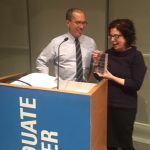
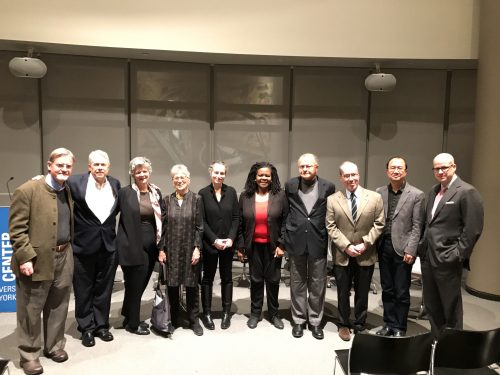
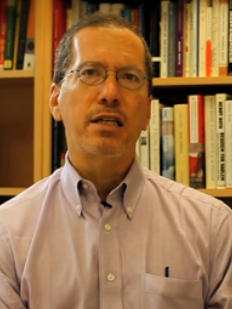
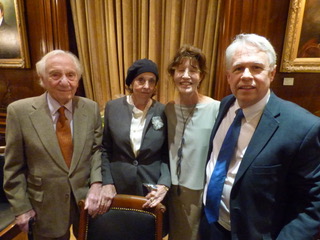
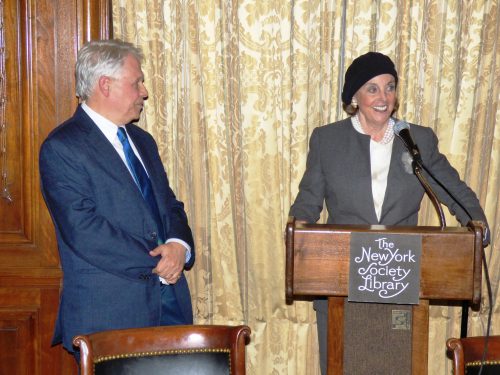
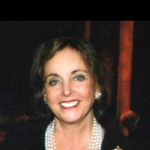 In the course of fifty years, Nan Talese has edited and published some of the most distinguished biographiess and nonfiction works of our time, including A. Alvarez’s enduring classic, The Savage God: A Study of Suicide; Thomas Kenneally’s Schindler’s List; Phyllis Rose’s Josephine Baker in Her Time; François Gilot’s Matisse and Picasso; Benita Eisler’s O’Keeffe and Stieglitz; Antonia Fraser’s Marie Antoinette; many books by Peter Ackroyd, including The Life of Thomas More, Shakespeare, Chaucer, J. M. W. Turner, Newton, Poe, Chaplin, and London Under: The Secret History Beneath the Streets; and Deirdre Bair’s Saul Steinberg and the forthcoming Al Capone: His Life, Legacy, and Legend, among many others. We spoke with Nan briefly about the experience of editing biography and what she looks for when considering the acquisition of a book.
In the course of fifty years, Nan Talese has edited and published some of the most distinguished biographiess and nonfiction works of our time, including A. Alvarez’s enduring classic, The Savage God: A Study of Suicide; Thomas Kenneally’s Schindler’s List; Phyllis Rose’s Josephine Baker in Her Time; François Gilot’s Matisse and Picasso; Benita Eisler’s O’Keeffe and Stieglitz; Antonia Fraser’s Marie Antoinette; many books by Peter Ackroyd, including The Life of Thomas More, Shakespeare, Chaucer, J. M. W. Turner, Newton, Poe, Chaplin, and London Under: The Secret History Beneath the Streets; and Deirdre Bair’s Saul Steinberg and the forthcoming Al Capone: His Life, Legacy, and Legend, among many others. We spoke with Nan briefly about the experience of editing biography and what she looks for when considering the acquisition of a book.